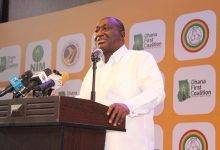
The Pharmaceutical Society of Ghana (PSGH) has called for a downward review of the proposed Electronic Transaction Levy (E-Levy), to facilitate smooth implementation of the “e-pharmacy project.”
The project suggested by government in the 2022 budget statement seeks to digitise the operations of pharmacies across the country for consumers to upload prescriptions and connect to the nearest pharmacies where drugs are available, and also get the drugs at reasonable prices, to promote health and wellbeing.
Although welcoming efforts bythe government to strengthen the pharmaceutical industry, the president of the society, Mr Samuel KowDonkoh, in a statement copied the Ghanaian Times, said the proposed E-Levy rate could be a disincentive for the success of the e-pharmacy project.
“The success of the proposed e-pharmacy project will be dependent on the integration and use of other electronic platforms like the use of electronic payment systems including mobile money payment to pay for services. This is why we are concerned about the 1.75 per cent levy on electronic transactions above GHC100 in addition to the network/system imposed charges (usually between one-two per cent to both the sender and receiver).
It is the belief of the PSGH that this will hamper the development and growth of electronic services including the e-pharmacy and has to be reviewed. We propose that the E-Levy be reduced to below one per cent while the total charges by the telcos are also reduced to below one per cent to those making mobile money transactions to accommodate the introduction of the E-Levy.”
Mr Donkoh further appealed to the government not to include imported pharmaceutical products into list of items which will have full benchmark values restored.
The president argued that, that would spell doom for the healthcare sector, as about 70 percent of medicines used in the country were imported and the restoration of full benchmark values would lead to increase in prices of medicines and scarcity.
“The restrictions imposed on exportation of medicines by many countries globally as a result of the COVID-19 pandemic means we have to accelerate the development of the local pharmaceutical industry while we continue to import finished pharmaceutical products needed for the health and well-being of our citizens.
Policies such as restriction of the importation of some selected medicines for which we have local expertise and capacity to manufacture as well as the waiver of VAT on some selected imported pharmaceuticals are welcome,” he added.
The 1.75 per cent tax on electronic financial transactions bank transfers, merchant payments and inward remittances shall be borne by the sender except inward remittances, which will be borne by the recipient.
It was proposed in the 2022 Budget Statement and Economic Policy of Government dubbed “Agyenkwa Budget (The saviour budget)” presented to Parliament by the Finance Minister, Ken Ofori-Atta, on Wednesday, November 17, 2021.
The Minister explained that the tax measure was to raise revenue to support job creation initiatives, entrepreneurship, youth employment, cyber security, digital and road infrastructure.
Should it come into effect from January 1, 2022, the levy will be applied on the value of every transaction above GHc100 on all electronic money transfers.
BY ABIGAIL ANNOH







